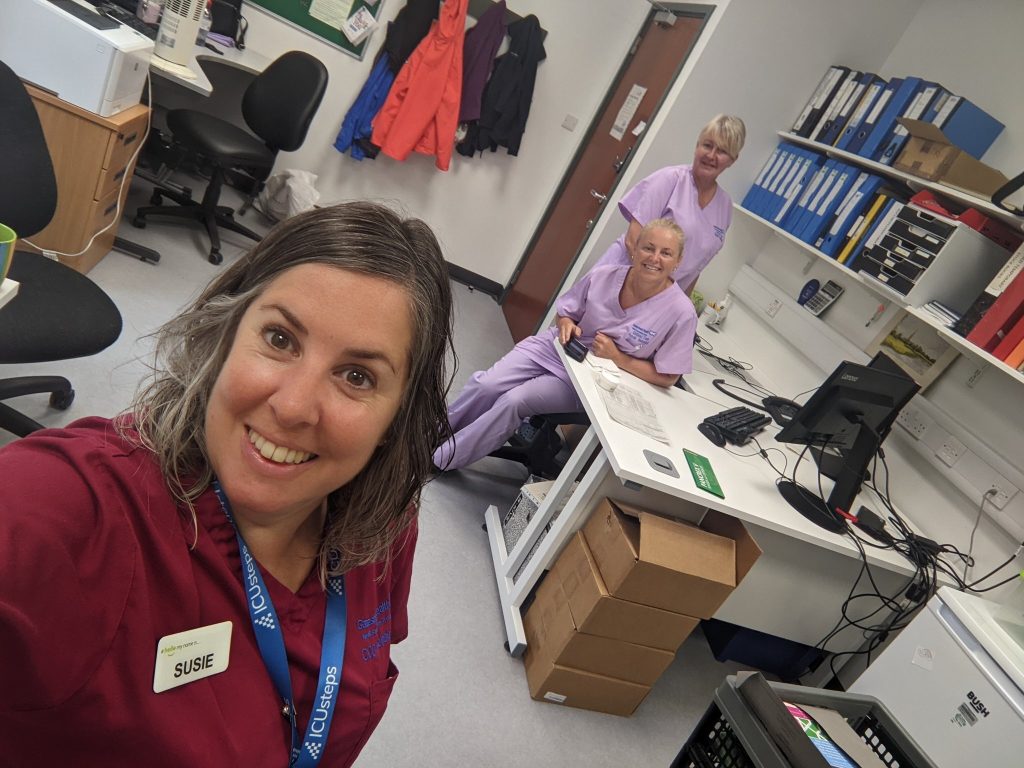
The critical care rehabilitation team is a small team consisting of one specialist nurse, two rehab assistants and two physiotherapists who work alongside the critical care team to help rehabilitate patients who have been in critical care, also known as ICU (intensive care unit).
The team deals with a range of patients and assists their journey from being in critical care to after they are discharged.
The rehabilitation programme is designed to prepare patients for their discharge, counter the effects of critical illness, give them their independence back and help them understand what has happened to them while they have been in hospital.
Susie Chrystal, specialist nurse in critical care rehabilitation said: “We are very fortunate to have a team like ours as many Trusts across the country don’t have a rehab team and it’s extremely important to have this support for people who go through critical illness.
“The rehab team can help patients from getting washed and ready, improve their mobilisation and assist with simple tasks to help regain their independence.
“These tasks sound simple but require a lot of work when a patient has been bedbound for two weeks and has lost a lot of strength. It takes time to coax people around to getting out of bed and move around but it is worth the work when the patients walk out of the hospital.
“There is much more we could do and we are working with occupational therapists to get them more involved along with psychologists to get their input on our patients.
“I am extremely proud of the team we have here at Gateshead and the work we do every day. It makes a real difference to our patient’s journey, during and after their time in critical care.”
Sonia Elliott, rehabilitation assistant said: “I absolutely love my job and I am very lucky to have the role I have. It’s really important to follow the patient’s journey, to have a relationship with them and their family because the end goal is for them to go home and to live life and be able to manage, not struggle.”
Claire Hall, rehabilitation assistant said: “The benefits of our job role is being able to give patients the time and help them remember the reason why they’re here to get better.
“The care we give patients throughout their journey helps give them a purpose and to regain their life back post-discharge. We are there all the way with our patients and although it can be tough physically and mentally, the hard work pays off when they eventually go home to their loved ones.”
Here is what patients have to say about the rehabilitation team:
“Both my wife and I found the support from the rehab nurses invaluable. They spent so much of their valuable time with us, literally holding our hands.”
“The rehab team were fantastic. I would not have improved as quickly without them. I was so scared of everything, but they helped me massively to improve even though I was scared.”
The work of the rehabilitation team doesn’t stop once a patient is discharged, a support group has been set up for ex-patients and their relatives to get together to share their experiences and talk to those who understand what they have been through. The support group ‘ICUsteps Gateshead’ are held monthly at a nearby church to the hospital and is well attended.
See what ex-patients from ICU steps have to say about the support network:
“Having a safe space to talk through our experiences. The group is friendly and we all have a good laugh!”
“I find it so helpful to meet up with other people who have gone through similar experiences. They understand how I feel.”
“Everyone encouraged me to push myself, just a bit more to recover to full mobility.”